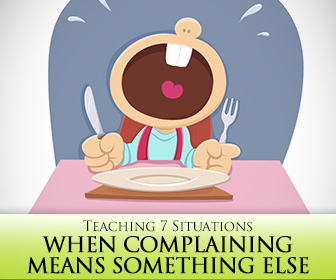Hello, How are You; Hot Enough for You? and See You Later: Conversational Routines Your Students Need to Know


We do not realize because we are not always complaining but using complaint language to express an opinion, a concern, or to relay another concept. Here are 7 fun ways to illuminate your learners on the particularities of complaining, critiquing, and euphemizing with situational activities for your conversation class.

Native English speakers like food to be perfect, and they are quick to comment if it is not so. These critiques are not necessarily complaints, but they sound like complaints to non native speakers who might think it is rude to criticize food! Emulate restaurant ordering and complaining with a role-playing activity. This will practice restaurant ordering dialogue as well.
You can use a similar role playing game for other service industries, like hotels. The learning objective is explaining the formula that when a customer complains about something not being exactly how she wanted, the other person should be polite and apologetic and look for a solution to change the situation to the liking of the customer.
Many cultures would not dream of criticizing or complaining about family members, but English speaking natives do so on a daily basis! Most native English speakers learn to be independent and think freely from their parents and siblings early on, so they clash often with family, especially in laws that think differently than their family.
This is a great way to practice complaining behind someone’s back as well as simple past tense verbs!
Bad weather makes people grumpier, and native English speakers live mainly in fickle climates and hence grumble about gray skies frequently.
Waiting annoys most born with the English tongue. Practice “waste of time” language in your conversation class.
We complain about our bosses and about work. It is good to teach the specific situations that annoy English speakers so that ESL students understand the derivation of such anger in the workplace.
Create scenarios on a list or hand out on pieces of paper to each student and have them read the sentence and try to guess why it would make the speaker so mad. You can discuss how cultural values drive annoyance.
Native English speakers will actually complain to their bosses or other people that seemingly have control over them to change a situation they view is unjust, which is somewhat unique in a generally order-taking world. Teach what situations are considered unjust and how to complain about them politely to try to change the situation by passing out scenarios and having students try to create a complaint. They can write their complaints or verbally discuss them. Teach soft complaint language like “I would like to discuss an issue with you; a situation happened that bothered me a bit; I think maybe you overlooked this detail”. Scenario examples include:

The romantic relationship is the source of the most confusing complaint language in English. While a whole article could be devoted just to this subject, try a simple conversation exercise where students talk about love gone wrong or things their partners do that irritate them.
By including it in your EFL lessons, you will be providing a service to your students as well, as it is critical to understand the values that drive irritation, annoyance, and criticism within English speaking cultures.